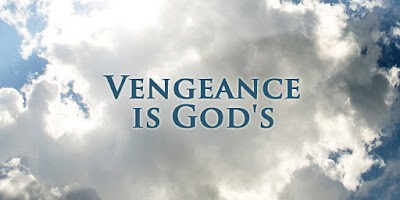Vengeance
“Vengeance is mine.” God claims in the
Bible. [Deuteronomy 32:35, and many other places]
“God is a mean-spirited, pugnacious bully
bent on revenge against His children for failing to live up to His impossible
standards.” Walt Whitman
 |
| Image courtesy Robert Hatfield |
I wish moral
vengeance was a natural law like gravitation. The law of gravitation will wreak
its revenge on you if you try to fly from the top of a building. Similarly if
there was a natural law for immoral acts, there would be no evil in the world.
For example, if you do evil to a person nature will punish you with a
proportionate evil.
But nature
knows no such morality. On the contrary, nature has an unbalanced proportion of
evil. Human civilisations have been relentless efforts to bring nature’s evil
under man’s control. And morality is man’s effort to bring under control the
evil within himself. Religions are supposed to assist man in the process of
making himself virtuous. That they have failed in it miserably is a different
matter.
“Should we
take revenge? Or forgive and move on? Or tolerate and stay?” This is the prompt
of the latest edition of In[di]spire. My personal feeling is that
vengeance is evil. It is returning evil with evil. Thus the sum total of evil
increases. As the Mahatma said, an eye for an eye will make the whole world
blind.
Moreover,
there is something terribly paradoxical about vengeance. Vengefulness makes you
dependent on those who harmed you. You believe that your release from pain will
come only when your enemy suffers. I wouldn’t like my happiness to be dependent
on any other person, particularly those who harmed me.
However, what
will I do if someone wreaks havoc in my life? Am I magnanimous enough to
forgive and move on? Or even tolerate and stay? I’m not sure. No one has
wreaked such havoc in my life so far and hence I can’t speak from experience.
My gut feeling is that I’m not so magnanimous.
When I watch
movies of vengeance where the protagonist decimates the villain[s] I feel the
act is justified. There are certain evils which call for vengeful retaliation,
my guts tell me. But my rational mind revolts against vengeance too merely
because more evil is not the remedy for evil. But would I tell that to Othello
if he decided to decimate Iago having come to know the whole story? Nope. Iago
deserves decimation. The world will be a better place without Iagos.
In other
words, when it is a question of removing certain big evils from the world,
vengeance is vindicated as far as my morality is concerned. That is what the
protagonists do in movies.
In real life,
villains rule the roost, however. We live in a Machiavellian world. Machiavelli
counselled the extremes of ‘caress or crush’. If you leave a person with a
minor injury, he will return to take revenge, advised Machiavelli. Hence
cripple them so much that they are rendered impotent to take revenge. We are
actually witnessing this principle in practice nowadays. The present political
system in the country seems to be highly Machiavellian. A few are caressed and
the majority are crushed. That is why I wish nature had a moral system.
I know that my
wish will never, never materialise. So I choose to go with Marcus Aurelius
[whom I celebrated in a short story, Marcus Aurelius Dies]: “The best revenge is not to be
like your enemy.”
Afterthought: Has it ever struck you that India
is increasingly becoming like its enemy? That’s why Shashi Tharoor called it
‘Hindu Pakistan’. Are we taking revenge or are we admiring our enemies by
emulating them?
Deep thoughts.
ReplyDeleteGreat response to my prompt :)
Even if the villain cripples his enemy, the latter can take revenge by hiring people- just what happened in the Hindi movie Sholay- Gabbar Singh chops off Thakur's arms and the latter gets Jai & Veer to take revenge.
I feel no one can escape karma.
Happy Diwali!
I'm glad your prompt brought you here after a long time.
DeleteIndeed in today's world even Machiavelli is outsmarted. We have people to do any work on hire.
Karma's revenge (or reward) is not always reliable.
While vengeance is not right, one should have right to hit back when all else fails. I guess negotiation should be tried. But sometime, negotiation does not help and oppressor does not want to backout. But forgiveness is good for the forgiver if done with right intent and a clean mind. It gives peace of mind.
ReplyDeleteI'm with you on this. One cannot go on forgiving endlessly. When all else fails one has to hit back. Otherwise forgiving is a great virtue.
Delete